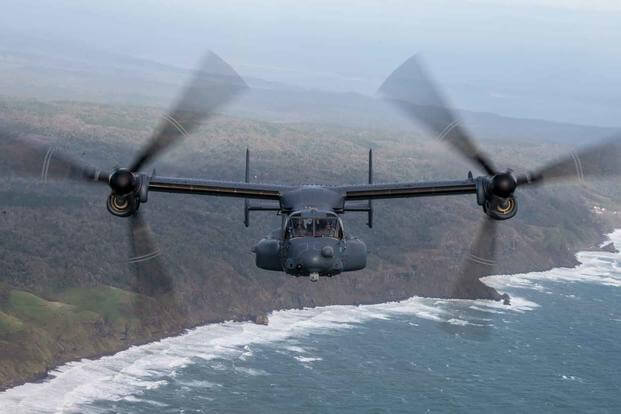U.S. and Japanese search teams found the remains of five Air Force crew members and wreckage from the Nov. 29 crash of a CV-22B Osprey near Yakushima Island off the coast of Japan, the service said.
Dive teams located the missing crew as well as the main fuselage of the aircraft, which went down in the ocean during training, according to a Monday statement from Air Force Special Operations Command. Two of the airmen on the Osprey remained missing Monday, after the remains of another crew member was recovered last week.
"The dive teams were able to confirm five additional crew members from the original team of eight that were involved with the crash," Air Force Special Operations Command said. "Currently, two crew members of the five located today have been successfully recovered by the attending teams. There is an ongoing combined effort to recover the remaining crew members from the wreckage."
Remains of one crew member were found hours after the wreckage on Nov. 29. Military.com reported on Friday that the remains of the deceased airman was identified as Staff Sgt. Jacob Galliher, a native of Pittsfield, Massachusetts, after his congressman, high school, local police department and family posted statements online and published press releases.
Air Force Special Operations Command confirmed that information on Saturday, saying the 24-year-old airman joined the service in August 2017 and served as a direct support operator assigned to the 43rd Intelligence Squadron, Detachment 1, Operating Location -- Alpha, 363rd Intelligence, Surveillance, and Reconnaissance Wing based out of Yokota Air Base, Japan.
He was an honor graduate of basic military training, a distinguished graduate of the Air Force's Cryptologic Language Analyst Course and an honor graduate of the Defense Language Institute's Chinese Language Course, according to the service. He has been recognized with the Air Force Achievement Medal, Air and Space Commendation Medal, Air Force Outstanding Unit Award and Air Force Meritorious Unit Award.
"Jacob was a beloved husband, father, son, and brother as well as a model airman who will be forever remembered for his dedication to this great nation and his fellow warriors," Maj. Gilbert Summers, the 43d Intelligence Squadron, Detachment 1 commander, said in a statement. "He has left an indelible mark as a devoted family man, steadfast wingman, and an irreplaceable airman in both duty and compassion."
Two other crew members' remains have not yet been located. The identities of the five located remains had not yet been released Monday.
Last week, Air Force Special Operations Command said the CV-22B Osprey, assigned to the 353rd Special Operations Wing, was on a training mission off the shore of Yakushima Island -- between the Japanese mainland and Okinawa -- with the eight airmen aboard when it went down in the ocean.
Sabrina Singh, a Pentagon spokeswoman, said in a statement Friday that the Air Force unit that owned the Osprey had grounded its other Ospreys and additional inspections of the U.S. military's aircraft based in Japan were underway.
"The unit of the CV-22 that had the accident is not conducting flight operations," Singh said. "All V-22 Ospreys in Japan operate only after undergoing thorough maintenance and safety checks."
Japanese officials voiced public concerns about the dual-rotor aircraft, which can fly like a helicopter or airplane, following the incident and called for their own country's fleet of Ospreys to be grounded amid investigations into Wednesday's crash. The Japanese Self-Defense Forces have 14 Ospreys in their fleet.
It's not yet clear what caused last week's crash off Yakushima Island.
Prior to the deadly Air Force crash, two Marine V-22 Ospreys in Japan diverted on Sept. 14 within just two hours of each other due to "cockpit caution indications" in the aircraft while flying near where the Air Force Osprey crashed this week.
A Marine Corps Osprey crashed in Australia in August, claiming the lives of three Marines. Another Marine Corps Osprey went down last year in Southern California, killing five Marines. Investigation findings released in July showed the cause of that crash in California was a hard clutch engagement, or HCE, a mechanical issue that has plagued the aircraft for more than a decade.











